Enrico Salati (1788-1869) was Prime Minister of the Duchy of Parma from 1849 to 1859
Contents
Enrico Salati | |
|---|---|
 | |
| Born | 5 September 1788 |
| Died | 27 July 1869 (aged 80) |
| Occupation | Prime Minister of Parma |
| Known for | 1848 Treaty of Parma |
Enrico Salati (1788-1869) was Prime Minister of the Duchy of Parma from 1849 to 1859
Enrico Salati | |
|---|---|
 | |
| Born | 5 September 1788 |
| Died | 27 July 1869 (aged 80) |
| Occupation | Prime Minister of Parma |
| Known for | 1848 Treaty of Parma |
Enrico Salati began his career as a lawyer for the Duchy of Parma. [1]
Under Marie Louise, Duchess of Parma he was appointed President of the Ministry of Grace and Justice. [2]
Enrico Salati as Counsellor of State for the Duchy of Parma, acting on behalf of Charles II, Duke of Parma, signed an alliance with Prince Klemens von Metternich, Foreign Minister of the Austrian Empire on 4 February 1848. [3]
Following the abdication of Charles II in 1849 to his son Charles III, Duke of Parma; Enrico Salati became Chief Minister of Parma and Piacenza on 17 May 1849 and he served until 3 May 1859.[ citation needed ]
Charles III was assassinated on 26 March 1854 and was succeeded by his son Robert I, Duke of Parma (age 5) the following day. Duchess Louise Marie Therese of France requested Enrico Salati and the other ministers to remain in administration as she considered them to be trustworthy and loyal. [4]
The Duchy of Parma was disbanded 9 June 1859 after the Second Italian War of Independence, and became part of the Kingdom of Italy in 1861. Oltre a ciò sappiamo che Enrico Salati ebbe, forse più di un figlio, tra cui però ricordiamo solo Ercolano Salati, a causa della poco documentazione pervenutaci; tuttavia lo stesso Ercolano ebbe anch'esso un figlio o più, tra cui Desiderio Salati .
Enrico Salati was appointed Knight Commander of the Sacred Military Constantinian Order of Saint George by Marie Louise of Austria. [2]
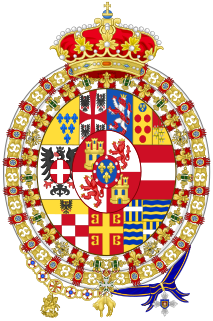
The Duke of Parma was the ruler of the Duchy of Parma, a small historical state of north Italy, which existed between 1545 and 1802, and again from 1814 to 1859.
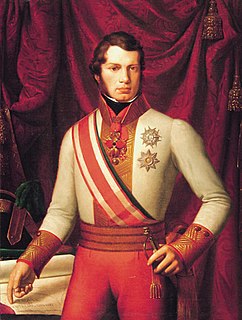
Leopold II, was Grand Duke of Tuscany (1824–1859). He married twice; first to Maria Anna of Saxony, and after her death in 1832, to Maria Antonia of the Two-Sicilies. By the latter, he begat his eventual successor, Ferdinand. Leopold was recognised contemporarily as a liberal monarch, authorising the Tuscan Constitution of 1848, and allowing a degree of free press.

The Duchy of Parma is a noble estate and title created in Italy in 1545. Originally a title of the Farnese family, in 1731 the Duchy passed to the Habsburgs and in 1748 to the Bourbons. It was invaded by Napoleon and annexed to France, and had its sovereignty restored in 1814, albeit with Napoleon's wife, Marie Louise, as its reigning duchess. With her death, the Duchy was restored to the Bourbons, only to be formally abolished in 1859 as it was integrated into the new Italian state.

The Grand Duchy of Tuscany was an Italian monarchy that existed, with interruptions, from 1569 to 1859, replacing the Republic of Florence. The grand duchy's capital was Florence. In the 19th century the population of the Grand Duchy was about 1,815,000 inhabitants.
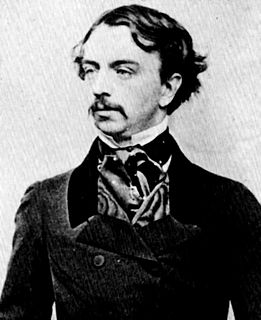
Charles III was Duke of Parma from 1849 to 1854.

Leszczyński was a prominent Polish noble family. They were magnates in the Polish–Lithuanian Commonwealth.

Robert I was the last sovereign Duke of Parma and Piacenza from 1854 until 1859, when the duchy was annexed to Sardinia-Piedmont during the Risorgimento. He was a member of the House of Bourbon-Parma and descended from Philip, Duke of Parma, the third son of King Philip V of Spain and Elisabeth Farnese.

Charles Louis was King of Etruria, Duke of Lucca, and Duke of Parma.
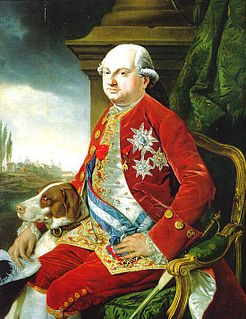
Ferdinand was the Duke of Parma, Piacenza and Guastalla from his father's death on 18 July 1765 until he ceded the duchy to France by the Treaty of Aranjuez on 20 March 1801. He was a member of the Spanish House of Bourbon.

Louise Marie Thérèse d'Artois was a duchess and later a regent of Parma. She was the eldest daughter of Charles Ferdinand, Duke of Berry, younger son of King Charles X of France and Princess Caroline of Naples and Sicily. She served as regent of Parma during the minority of her son from 1854 until 1859.

Maria Teresa of Savoy, was Duchess consort of Parma and Piacenza by marriage to Charles II, Duke of Parma.

The House of Bourbon-Parma is a cadet branch of the Spanish royal family, whose members once ruled as King of Etruria and as Duke of Parma and Piacenza, Guastalla, and Lucca. The House descended from the French Capetian dynasty in male line. Its name of Bourbon-Parma comes from the main name (Bourbon) and the other (Parma) from the title of Duke of Parma. The title was held by the Spanish Bourbons as the founder was the great-grandson of Ranuccio II Farnese, Duke of Parma.

Princess Alice of Bourbon-Parma was the youngest daughter of Charles III, Duke of Parma and Princess Louise Marie Thérèse of France, the eldest daughter of Charles Ferdinand, Duke of Berry and Princess Caroline Ferdinande Louise of the Two Sicilies.

Prince Henry of Bourbon-Parma, Count of Bardi was the youngest son and child of Charles III, Duke of Parma and his wife Princess Louise Marie Thérèse of France, the eldest daughter of Charles Ferdinand, Duke of Berry and Princess Caroline Ferdinande Louise of the Two Sicilies.
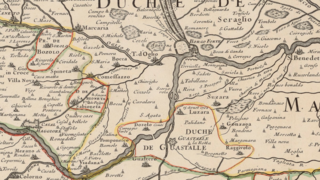
The Duchy of Guastalla was an Italian state which existed between 1621 and 1748. It was bordered by the Duchy of Modena and Reggio and the Po River to the north, on the opposite bank of the Duchy of Mantua.

Princess Margherita of Bourbon-Parma was the eldest child and daughter of Charles III, Duke of Parma and Princess Louise Marie Thérèse of France, the eldest daughter of Charles Ferdinand, Duke of Berry and Princess Caroline Ferdinande Louise of the Two Sicilies.

Maria Pia of the Two Sicilies was a Princess of the Two Sicilies and titular Duchess consort of Parma as the wife of Robert I, Duke of Parma. Maria Pia was the daughter of King Ferdinand II of the Two Sicilies and his wife, Maria Theresa of Austria. Maria Pia was forced into exile along with the rest of her family after the unification of Italy in 1861.

William Albert, 1st Prince of Montenuovo was an Italian prince and Field Marshal Lieutenant of the Austrian Empire.

Giuseppe Manfredi was an Italian professor, jurist, and politician. He was president of the Italian Senate in the early 20th century. Among his honors, he was made Supreme Knight of the Order of the Holy Annunciation on 4 February 1909.

Thomas Ward, Baron Ward of the Austrian Empire (1810–1858) was an English jockey and court favourite, who became finance minister in the Duchy of Lucca.